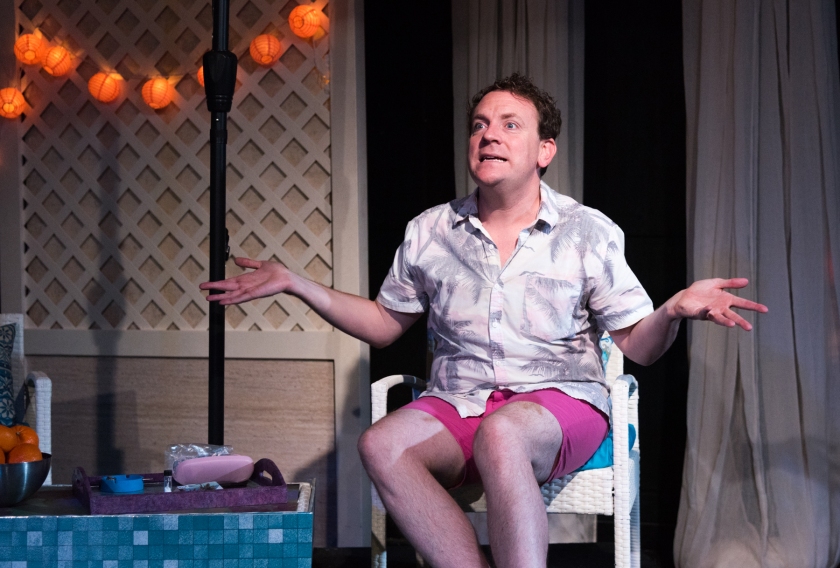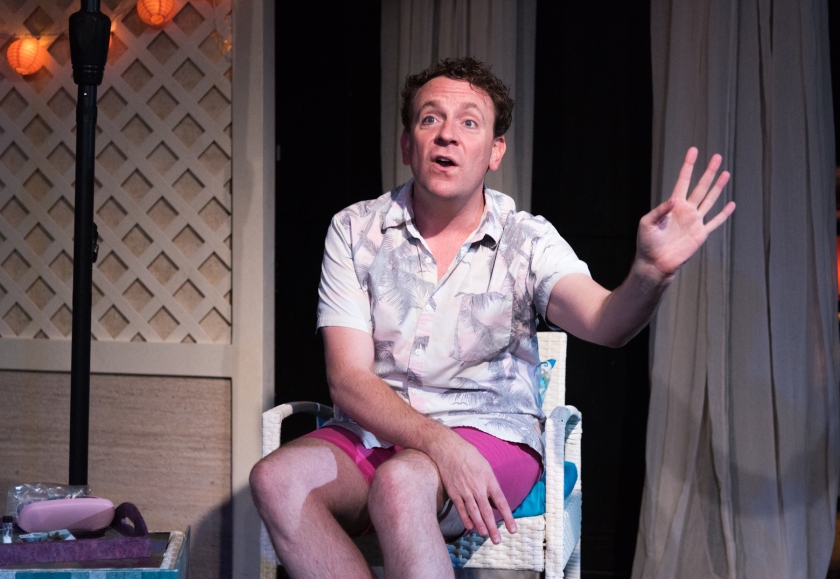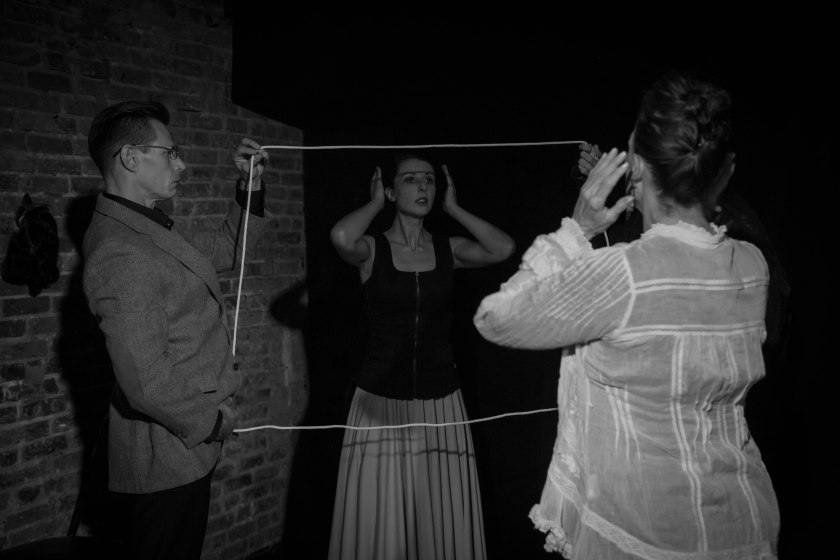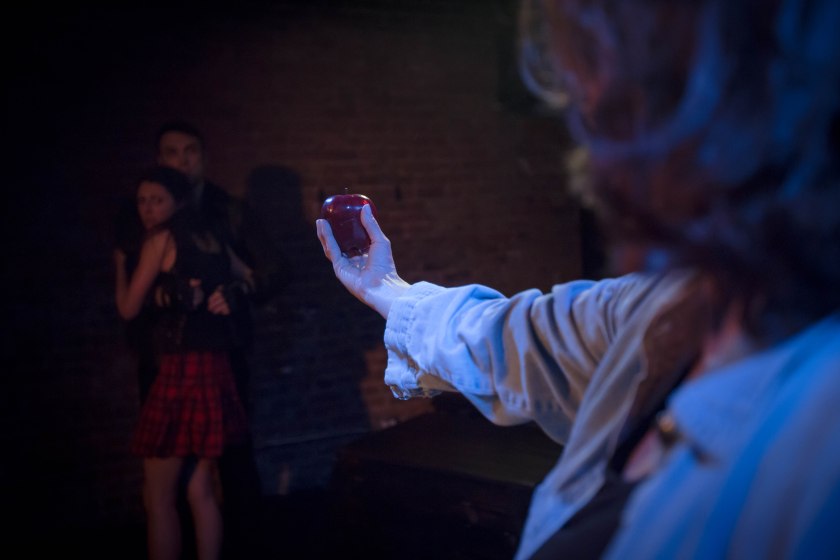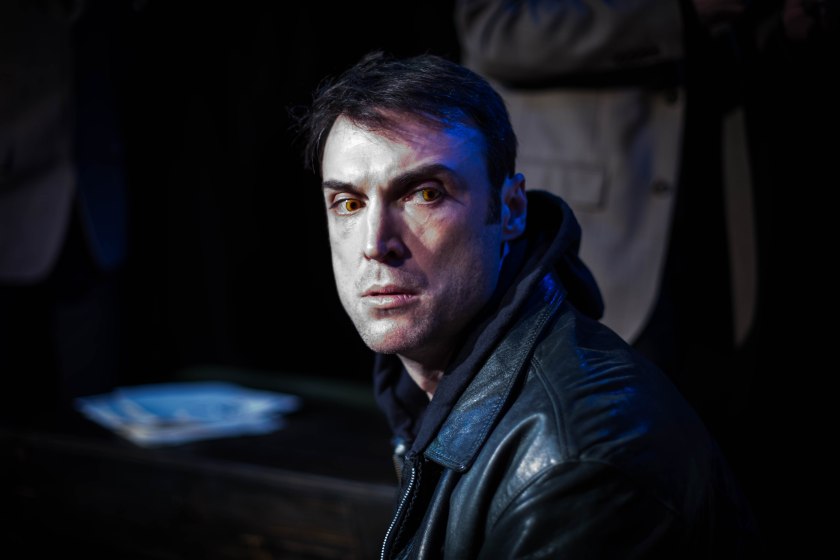They say it takes a really good singer to sing really badly. That meta comedy sensation Screlton McNodes should grace Feinstein’s/54 Below comes as no surprise to anyone, then, even if he “didn’t get the 7:30 slot.” Born of a spring break gag, a sleeper hit Youtube video, and creator Martin Landry‘s desire to take his career into his own hands, Screlton McNodes is your typical cat-musical-producing comedic-screlting deep-South victim of child abuse.
And it sucks so very, very good. McNodes lays both claim and waste to the entire musical theatre canon straying more from the melody than Mariah Carey and screeching enough to make Chuck Shuldiner blush. His setlist includes many perennial favorites such as “Defying Gravity,” “Let It Go,” and “Tomorrow,” but trust me, they are like nothing you’ve ever heard before.
Landry’s screlting (an amalgam of “screaming” and “belting”) technique is well-honed and curiously methodical. In the hands of a lesser performer, the act of comedically singing poorly might seem straightforward, but McNodes’ is a controlled chaos: His register, his enunciation, and his modulations are all to some extent deliberate. The patterns he sows, he later reaps with repetitions. Clear example: His habit of frequently ending verses with an “o” vowel no matter the rhyme. And it lands like thunder; the audience eats it right up.
Of course, it’s still something of a relief when the guest vocalists were invited onstage (The screlting, however masterful, became somewhat obtrusive after long periods). And McNodes has assembled an impressive roster: The supremely talented Christina DeCicco and Hannah Elless stepped in for some real Broadway-caliber belting, and each delivered or participated in a bit between songs. Special shout-out to Janice Landry, who stood in last-minute for an absent Sara Jean Ford (citing babysitter troubles), and still delivered an airtight rendition of “Let It Go.” And of course, to expert musical direction and accompaniment by James Dobinson, who even managed to sneak in a little characterization for himself.
The real juice of the guest appearances, though, was in the duets. Watching McNodes jointly sing and even harmonize with his guests was like witnessing an impossible combination of sweet and savory. The blend of ironic and unironic good creates a peculiar, but ultimately tickling and pleasant effect.
That said, McNodes is still here to give a show, and not just a concert. Despite the success of the other factors, the comedy was definitely the strongest part of the evening. Aside from his remarkable command of humor and physicality, Landry’s natural charisma and quick-wittedness allows him to establish a unique rapport with the audience as a character (McNodes) who possesses neither.
The narrative itself is of, as the title suggests, a Broadway-loving Screlton McNodes growing up in rural Alabama with abusive parents. His only solace was the cast recordings of Broadway musicals he listened to, and then proceeded to produce in his barn by casting the neighborhood cats as the characters. Thus Landry, as McNodes, tackles familiar and beloved works of musical theatre for the bulk of the show. A hairball of an endeavor they turned out to be: The almost always ill-fated productions were the source of many antics, and yielded strong laughs from the audience even as the tone grew darker and the ending tragic (in how McNodes ultimately responds to his household situation).
Which is my only real reservation about the show. Landry proves adept at the Dave Barry-esque principle of using laughter to express the “anxiety of knowing [we] in a world devoid of reason.” He is very careful in his use of self-effacing dark comedy to address the tragedies in his narrative, and in managing the tone of his performance with which he handles them. Overall, McNodes’s account is defiantly uplifting despite that which befell him, and it’s no surprise that real victims of abuse have remarked to Landry the therapeutic and cathartic qualities of the show. Furthermore, his exploits as a quirky musical theatre lover from a humble background with big dreams and an uneasy path to realizing them bears an emotional core that’s no doubt relatable to much of the show’s target demographic. However, the story does run the risk of tonal muddles between the comedy and the tragedy, in which case it might elude some audience members, and even disturb others.
Which, for the record, did not seem to be a problem at all at 54 Below. On Thursday November 15 of 2018, as the renowned supper club welcomed Screlton McNodes in a special one-night re-engagement of his solo show, New York City welcomed the abrupt return of heavy winter snow in a one-night preview of its incipient baby blizzards.
But McNodes, the indomitable, was matched in dedication by his fans and supporters, who with the exception of Sara Jean Ford all made it to the performance, and from a variety of origins for which (I heard) the journey made was less than smooth, especially in that weather.
And the ovations that night could’ve rivaled those at a Bette Midler concert. Rightly so, says I.
Special thanks to the producer Ashley Griffin, without whom the show might not have been possible, but without whom this review DEFINITELY would not have been possible.



